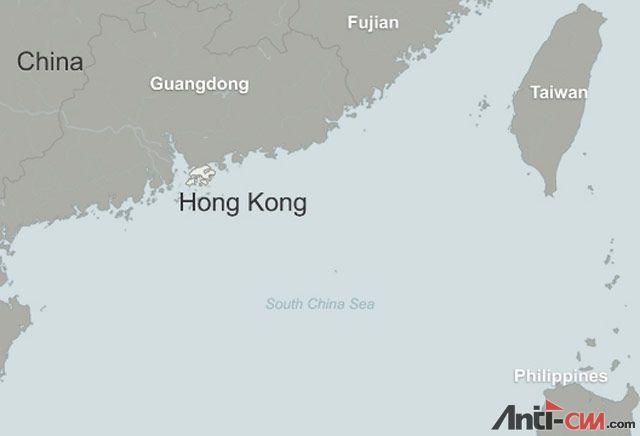|
|
本帖最后由 seal 于 2010-6-6 23:05 编辑
【中文标题】中国的审查制度可能导致人才流失
【原文标题】China's censorship could lead to a brain drain
【登载媒体】CNN
【来源地址】http://edition.cnn.com/2010/TECH/web/06/03/hong.kong.students.google/
【译者】seal
【翻译方式】人工
【声明】本翻译供Anti-CNN使用,未经AC或译者许可,不得转载。
【原文库】http://bbs.m4.cn/thread-246459-1-1.html
【译文】

"Li Cheng" is one of many Chinese students who are flocking to Hong Kong to get around Beijing's internet censorship.
“李诚”是众多涌入香港以避开北京互联网审查的中国学生之一。
Hong Kong, China (CNN) -- They are coming from cities across China, including Beijing and Shanghai:
中国香港(CNN) -- 他们来自中国各地,包括北京和上海:
Students are leaving mainland China for the opportunity to study in Hong Kong instead.
为了寻求机遇,学生们正离开中国大陆,前往香港求学。
"We are a small elite who can afford freedom beyond China's great firewall," says "Li Cheng" from Shanghai.
“我们是身在中国防火长城之外,拥有自由的少数精英,”来自上海的“李诚”说到。
Li, a student at the University of Hong Kong, did not want to disclose his real name or details about his study program, fearing consequences back home.
李是香港大学的一位学生,由于担心回家的后果,他不愿意透露自己的真实姓名和所学课程的细节。
"I live in one country, but it feels like having two identities," Li said. "In Shanghai, I use special software to access sites blacklisted by the government, like Twitter or the uncensored version of Google.
“我生活在同一个国家,但感觉像是拥有两个身份,”李说。“在上海,我使用特殊的软件去访问被政府列入黑名单的一些网站,比如Twitter或者未经审查的Google版本。”
"In Hong Kong, I am taught to integrate these tools in my research."
“而在香港,在我的研究中,我被教授如何整合这些工具。”
In the past, students such as Li would have to travel to far-away countries to get around Beijing's control of information.
在过去,像李这样的学生只能前往遥远的其他国家才能避开北京的信息控制。

Now, they are taking advantage of Hong Kong's special administrative status that allows for a "one country, two systems" rule until 2047.
现在,他们正得益于香港的特别行政区地位,“一国两制”政策保持香港的这种地位直到2047年。
Hong Kong is nothing like mainland China in terms of its free flow of information, freedom of speech and multiparty political system.
香港拥有新闻自由,言论自由,实行多党派政治制度,这与中国大陆显著不同。
Those differences were recently emphasized by Google's row with the Chinese government over censorship.
随着最近谷歌和中国政府在审查制度上的纷争,这些差异更显突出。
In March, Google announced it was routing its users to an uncensored version of the internet search engine based in Hong Kong, amid speculation that Google would pull out of China entirely.
在三月,谷歌宣布将其用户转到位于香港的未经审查的网络搜索引擎,外界猜测谷歌将完全退出中国。
"When Google redirected its site from China to Hong Kong, it meant a lot of publicity for our free harbor," said David Bandurski, a China analyst at the University of Hong Kong (HKU). He studies censorship issues.
“谷歌将他的站点从中国重定向到香港,这对我们的自由港起到很大的宣传作用,”David Bandurski说。David 是香港大学(HKU)的一位中国事务分析家,他研究审查问题。
"[Google's] move has emphasized Hong Kong's significance in China, benefiting from the rule of law and its potential as a free information hub."
“[谷歌的]迁移突显香港在中国的重要性,这得益于香港的法治和成为自由的信息枢纽的潜力。”
Many young Chinese have explored that hub since 1997 when the the British colony was handed over to China, paving the way for Chinese from the mainland to apply to universities in Hong Kong.
自从1997年,香港这片英国殖民地被移交给中国,大陆学生申请香港高校的道路铺平了,许多年轻的中国人开始来这里探索奋斗。
The influx of students applying from the mainland created fierce competition to enter Hong Kong's top universities.
大陆学生大量涌入,他们为进入香港的顶尖大学展开激烈竞争。

Hong Kong is hosting more students from China's mainland. Analysts say that's because of fewer restrictions on information flow.
香港正接待越来越多的内地学生。分析人员说这是因为香港对信息流通的限制较少。
The number of mainland Chinese applying for HKU's undergraduate program has increased more than tenfold in the past decade.
来自中国大陆的香港大学申请者人数在过去的十年,增长超过十倍。
In 2008, some 12,000 mainlanders applied for the 300 slots that HKU reserves for students from mainland China.
在2008年,香港大学为大陆学生提供的名额为300,而申请者达到12,000人。
Li Cheng said he considers himself very lucky to be studying in Hong Kong
李诚说,他觉得自己能够在香港学习十分幸运。
"Free access to information is a need and a privilege," he said.
“自由地获取信息是需要也是一种优待,”他说。
The influx of talent such as Li could signify a brain drain for mainland China, according to Bandurski.
Bandurski表示,像李这样的人才的流入对中国大陆来说,意味着人才流失。
"Without political reform, economic growth in China will decline," he said. "Talents will leave China. Students and teachers who want to have more access to information are not dissidents anymore. They are becoming the mainstream."
“如果没有政治上的改革,中国的经济增长将会放缓,”他说,“人才将会离开中国。希望获得更多信息访问的学生和老师们不是异见分子。他们正在成为主流。”
Asia's top five universities are now located in Hong Kong, Singapore and Japan -- outstripping their rivals in mainland China -- according to a recent ranking of QS, a higher education information network company.
据高等教育信息网络公司QS发布的最新排名,亚洲排名最高的5所高校位于香港,新加坡和日本 -- 超过他们的中国大陆竞争对手。
The top mainland school was Peking University in Beijing in 12th place, down from its previous ranking of 10.
大陆排名最高的学校是北京大学,名次为12,低于它此前的排名10。
The data show that "the tide has turned," according to Paul Denlinger, an internet consultant based in Hong Kong and Beijing.
据位于香港和北京的网络咨询顾问Paul Denlinger说,这些数据显示“趋势已经改变了”。
"During the dotcom era [of the 1990s], head-hunters were looking for talent from universities in Shanghai and Beijing," Denlinger said. "Now they are coming to Hong Kong."
“在网络兴起的时代[20世纪90年代],物色人才的人在上海和北京的高校寻找目标,”Denlinger 说,“现在他们正来到香港。”
With new freedom at hand, only a few fresh HKU graduates have returned to the mainland. Last year, only 3 percent of HKU graduates from mainland China returned home to look for a job.
拥有了新的自由,只有少数的香港大学毕业生选择返回中国大陆。去年,来自内地的港大毕业生中,只有3%的人返家寻找工作。
That matches the trend of Chinese students studying overseas.
这些情况也符合中国学生海外留学的趋势。
More than 70 percent of the more than 1 million Chinese students abroad did not return home after graduation between 1978 and 2006, according to a report by the Chinese Academy of Social Sciences
根据中国社会科学院的报告,从1978年到2006年,在超过100万中国海外留学生中,有70%的人在毕业后没有回国。
Aware of this brain drain, the Chinese government has recently introduced a plan to attract highly qualified students back to the mainland promising better living standards, including favorable access to medical care.
意识到人才流失,中国政府最近提出了一项计划,承诺更好的生活水平,包括优惠的医疗待遇,以吸引优秀学生回到大陆。
But that hasn't tempted Li Chang who, like many of his friends, wants to stay in Hong Kong.
但是这些并不能打动李诚,和他的许多朋友一样,他更愿意留在香港。
"I love my country, but I don't want to give up on my right to access information," he said.
“我爱我的国家,但是我不想放弃自己获取信息的权利,”他说到。 |
评分
-
1
查看全部评分
-
|